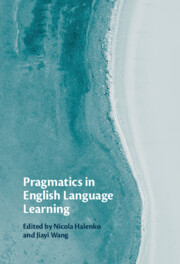Book contents
- Pragmatics in English Language Learning
- Pragmatics in English Language Learning
- Copyright page
- Contents
- Figures
- Tables
- Contributors
- Foreword
- Acknowledgements
- Introduction
- 1 Second Language Pragmatics
- Part I Pragmatics in Action
- Part II Instructed Pragmatics
- 6 Interlanguage Pragmatic Development in a German EFL Secondary School Context
- 7 ‘Learning to Say “No” in Different Ways’
- 8 Using Self-Access Materials to Learn Pragmatics in the US Academic Setting
- Conclusion
- Index
- References
8 - Using Self-Access Materials to Learn Pragmatics in the US Academic Setting
What Do Indonesian EFL Learners Pick Up?
from Part II - Instructed Pragmatics
Published online by Cambridge University Press: 29 September 2022
- Pragmatics in English Language Learning
- Pragmatics in English Language Learning
- Copyright page
- Contents
- Figures
- Tables
- Contributors
- Foreword
- Acknowledgements
- Introduction
- 1 Second Language Pragmatics
- Part I Pragmatics in Action
- Part II Instructed Pragmatics
- 6 Interlanguage Pragmatic Development in a German EFL Secondary School Context
- 7 ‘Learning to Say “No” in Different Ways’
- 8 Using Self-Access Materials to Learn Pragmatics in the US Academic Setting
- Conclusion
- Index
- References
Summary
Learners of English as a foreign language (EFL) typically do not have enough opportunities to develop their pragmatic competence, as their language learning activities often rely on textbooks (Kim & Hall, 2002) which are inadequate sources of pragmatic input (Ren & Han, 2016; Vellenga, 2004). Therefore, when EFL students become international students in an English-speaking country, they are likely to face communication struggles. This study explores the use of self-access materials including self-paced instructional videos, tasks, and reflection activities about requests in spoken and email communication within the US academic setting. Analysis of twenty-one Indonesian EFL learners’ responses to the tasks, self-evaluation, and questionnaires showed more varied formulation of request strategies, a shift towards using more hearer-oriented strategies, and raised awareness of contextual details (e.g., degree of imposition, power relationship, social distance). Findings suggest that learners can benefit from learning the pragmatics of US academic settings with the aid of self-access language learning materials.
Keywords
- Type
- Chapter
- Information
- Pragmatics in English Language Learning , pp. 200 - 227Publisher: Cambridge University PressPrint publication year: 2022

